基于主题意义引领的大单元整体复习设计案例
——学校生活
2022-12-01山东郭丽娜
山东 徐 影 郭丽娜
复习课型是高三备考的重要课型。高效率的复习不应只是对已学知识的简单重复,更应是对知识内涵的重新探究与拓展深化,是一个梳理、整合、优化与提升的过程。基于主题意义的大单元整体复习以主题语境为依据,以单元话题为抓手,以拓展学习的深度和广度为原则,注重把握知识之间的内在联系,具有整体性、系统性、逻辑性,利于学生掌握科学的学习方法,促进其从知识到能力再到思维的提升。
核心素养导向下的“大单元教学”设计,要求教师建立好学科核心素养与学科核心内容之间的关系,依据课程标准和教材,选择有利于培养学科核心素养的教学内容和情境素材,制定学习目标、选择学科内容、设计学习活动、开展课堂教学、进行学习评价,环环相扣,使学科核心素养具体化,可培养、可干预、可评价。下面,笔者将以人与自我主题语境中的子主题“学校生活”为例,谈一谈大单元整体复习的具体做法。
一、立足高考,基于课标,研读教材,梳理单元语篇内容和复习重点
学校生活主题下的语篇多以记叙文为主,而记叙文是高考的重要文体。《普通高中英语课程标准(2017 年版2020 年修订)》(以下简称《课程标准》)要求考生能明确记叙文的主要写作目的(如:再现经历、传递信息、说明事实、想象创作)以及这类语篇的主要结构特征(如:该类语篇的必要组成部分和可选组成部分、各组成部分的顺序等)。把握记叙文的文体特征和结构特点有助于考生正确理解语篇,提高解题能力及写作水平。基于此,笔者结合新教材,将记叙文特点及再现学校经历作为“学校生活”主题复习的重点目标,并做了如下整合:
主题语境:人与自我——生活与学习——学校生活
单元话题:学校生活
整合语篇:外研版2019 年版新教材必修一 Unit 1 A New Start
外研版教材第七册Module 2 Highlights of My Senior High
外研版教材第七册Module 2 My Schooldays
外研版教材第七册Module 2 After-school Activities

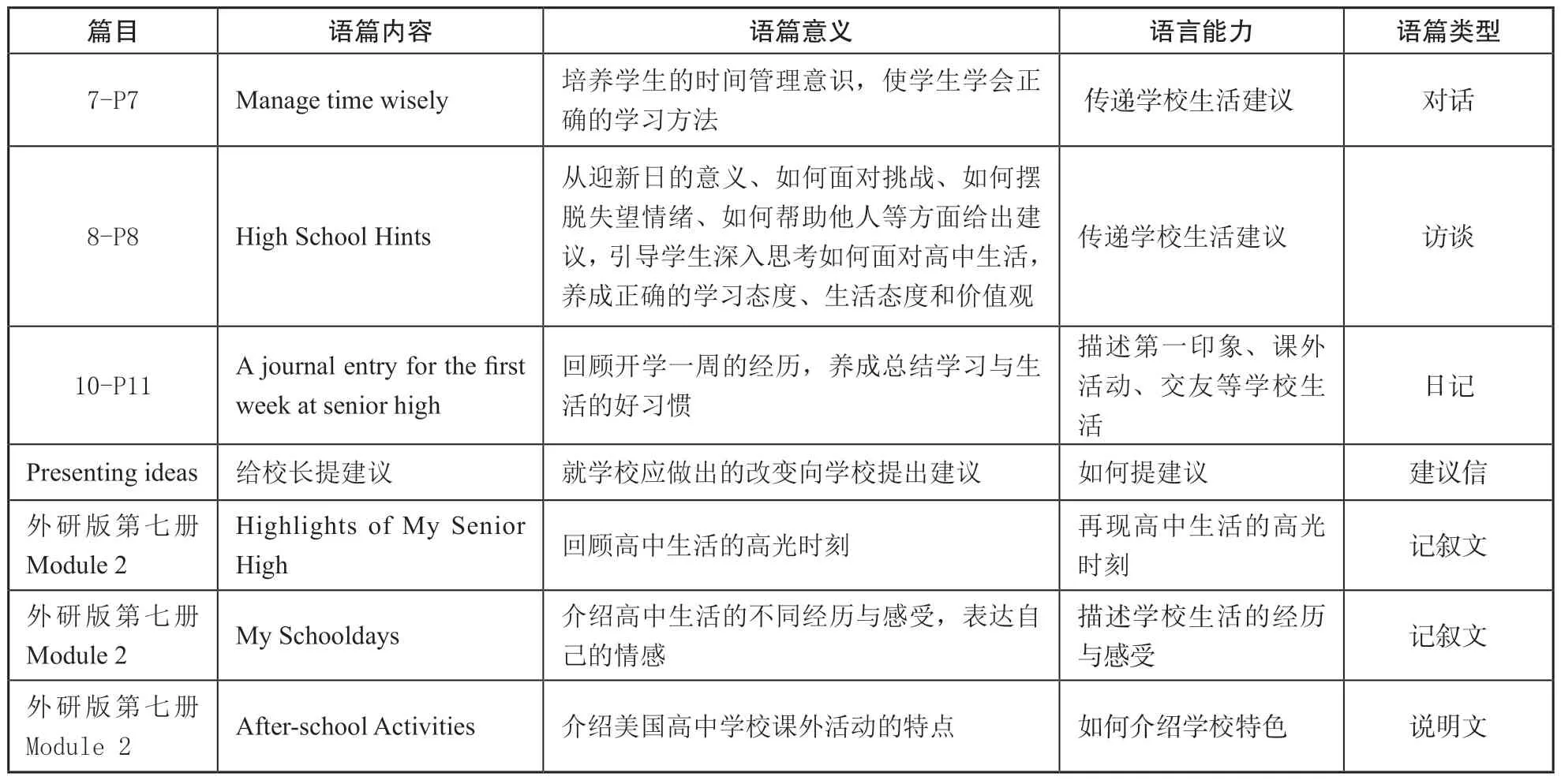
续表
二、确定大单元复习目标及课时目标
笔者将新旧教材中涉及“学校生活”主题的单元语篇进行了分析和整合,将主题划分为三个子话题,即开学初印象与学校经历、高中生活和高中生活建议,三个子话题层层深入,符合学生的认知规律;并基于高考及学情确定了大单元复习目标,制定了课时计划与课时目标,具体内容如下:
(一)大单元复习目标
通过头脑风暴、自主探究、交流合作、思维导图等多种英语学习活动形式,学生能够:
1.基于主题意义对本单元课文内容进行提炼与整合;根据主题意义建构与高中学习和生活这一主题有关的主题词块、主题语块和主题句式;拓展同话题语篇,进行补充和完善;
2.灵活使用本主题词块、语块、句式,准确、丰富地谈论与高中学校经历、课外活动/社团、学习生活建议等内容相关的话题;
3.识别习题中与本单元主题相关的文章,能够说出本单元语篇(记叙文、访谈、非连续性文本)的语篇类型特点,并使用恰当的阅读策略获取此类语篇信息;
4.看到自己升入高中以来取得的进步,保持好的学习与生活习惯,树立积极的人生态度。
(二)课时安排与课时目标
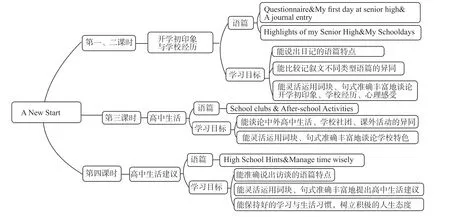
三、单元整体复习过程实施
确立好单元目标及各分课时目标,下面笔者将以课时一和二为例,详细展示复习实施过程。
课时一 First Impression &School Experiences
课时目标:能建构与校园印象相关的主题词块和句式;能准确地谈论高中生活初印象;能说出日记的结构特点和写作目的;能初步谈论学校经历,并建构相关主题词块、句式等。
学习方法:自主学习,问题引领,合作探究,头脑风暴,思维导图
教学过程:
Activity 1.Have a general review of the whole unit and think about topics relative to school life.
[自主学习,教师引领。归纳本单元主题并补充与主题相关的子话题,明确复习目标并对主题复习有结构化的认识。]

Activity 2.Recall how you felt on the first day at senior high and think about what can be mentioned.
【话题词块】
1.the first impression of your new school: fantastic/amazing/awesome/impressive/brilliant...
2.the things that you think most impressive: school campus and facilities/teachers and teaching methods/ school subjects/ after-school activities/school regulations...
3.feelings on the first day at senior high: eager/ excited/expectant/curious/nervous/proud...
[头脑风暴。回顾高中入学情景,能归纳开学初印象,并整理话题词汇,为整个单元的复习活动做铺垫。]
Activity 3.Review My First Day at Senior High and summarize how the writer felt about his first day.
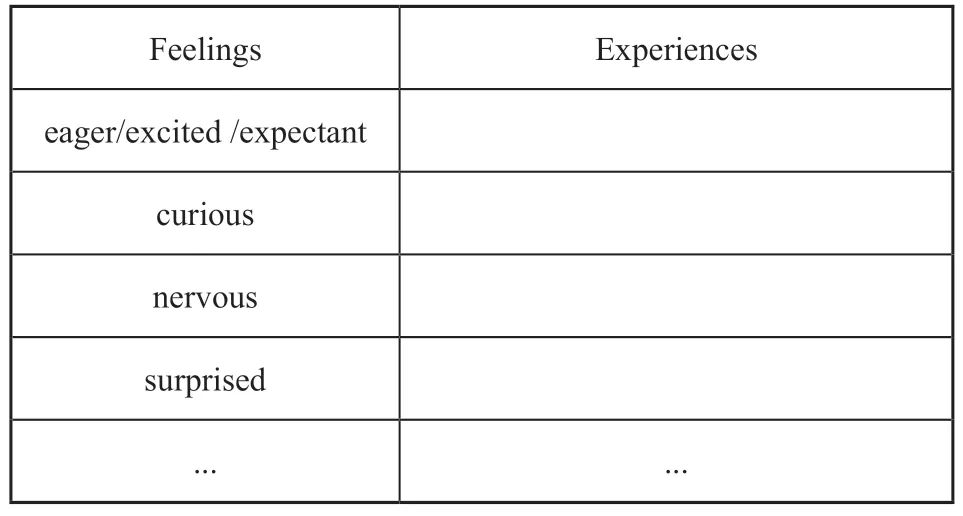
【话题句式】
I had pictured it over and over again in my mind and finally the big day arrived.
I woke up early and rushed out of the door in my eagerness.
I tried to turn on my brain but the engine just wouldn’t start.
...
[教师引领。学生学习“再现经历”的写作手法,如通过动作描写picture,rush,turn on 表达作者“excited,eager,expectant”的情感;使用副词及短语使画面感更加强烈;使用暗喻的手法将人脑比作引擎“engine”,将作者的紧张情绪展现得淋漓尽致。]
Activity 4.About the diary: order/format/event/theme
[教师引领。复习日记的语篇特点和结构特点,明确本单元日记的写作目的为记事言志;小组合作,整理话题相关句式,学习写作手法,为输出任务做充足准备。语言的学习是高三复习的重点,有助于学生语言感受力的提升。]
Activity 5.Review A journal entry and summarize how the writer felt about her first week.
【话题语块】struggle with/ hurry to/ bump into...
[自主学习。进一步体会日记的语篇特点,学习整理话题相关的英语表达并进行交流。]
Activity 6.Work in groups and make a mind-map of words and expressions focused on the topic.Your work needs to be logical and reasonable.
[合作探究。以思维导图的形式建构该课时话题的相关词块、句式、写作技巧等,使学习内容系统化、可视化。]
Activity 7.Share the mind-map in class and learn from each other to make the mind map more complete.
[合作探究。小组展示思维导图并进行交流补充,学生能有系统地对“学校印象”进行学习,并对“学校经历”的描写有初步的感知。]
Activity 8.Homework.Polish the mind-map of words and expressions based on the topic.
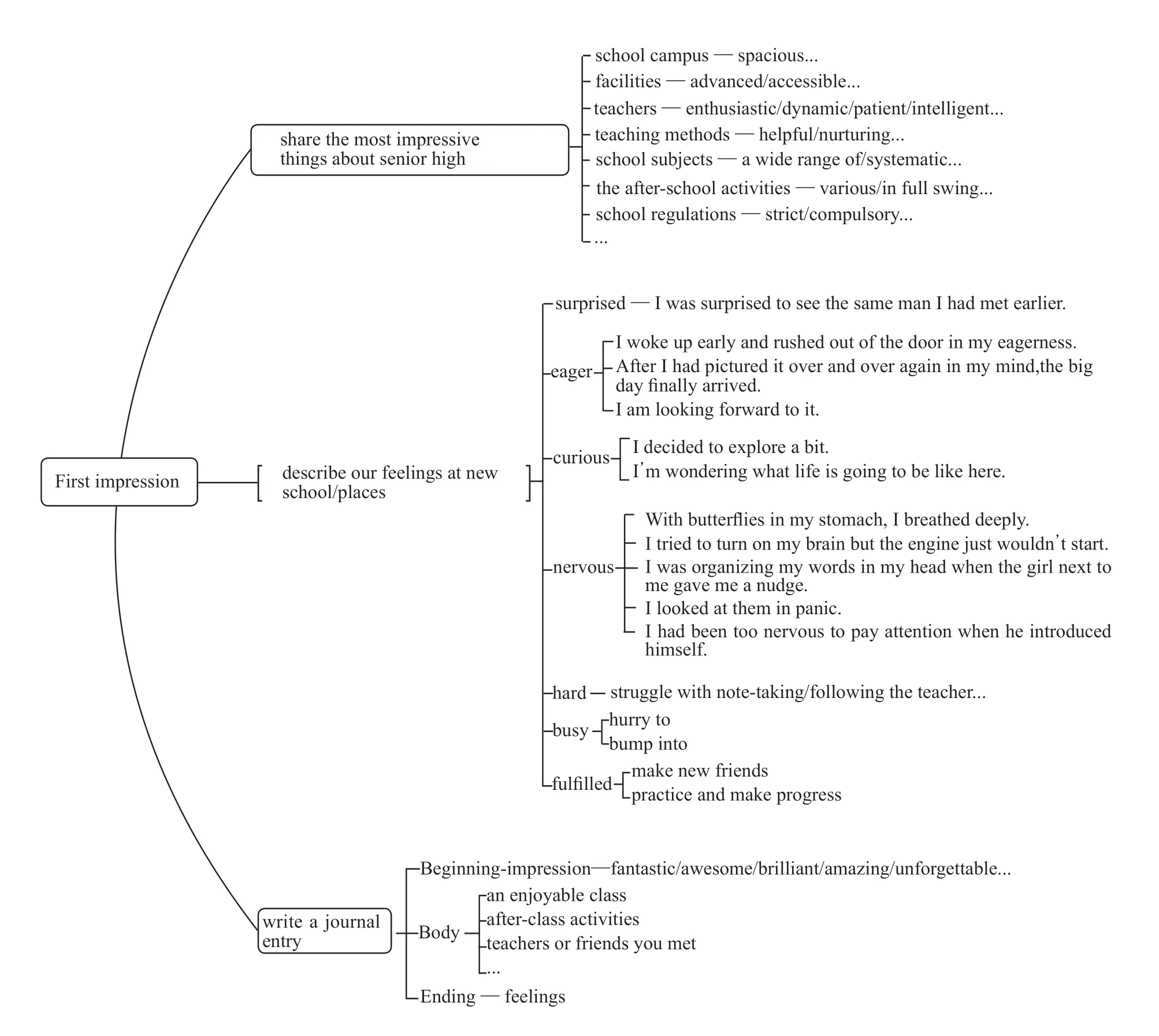
课时二School Experiences
课时目标:能建构与学校经历相关的主题词块和句式;能比较记叙文不同类型语篇的异同;能利用恰当的词汇、表达和写作技巧,描述高中生活的某次经历或高光时刻。
学习方法:自主学习,问题引领,合作探究,头脑风暴,思维导图,迁移应用。
教学过程:
Activity 1.Talk and share
Share an impressive moment you have experienced in your senior high.Describe the event and your feelings.
[自主学习,头脑风暴。激活已有知识,回顾第一课时所学,使学生对描述学校经历有初步的尝试,并能思考体会写作手法,为下面的阅读学习做准备。]
Activity 2.Highlights of the senior high
Read the passageHighlights of My Senior Highand think about the following questions.
Question 1: What are the highlights of the writer? How do you know that?
Question 2: Which is the most impressive for the writer?How does the writer make it known to us?
【话题词块】
receive high school diploma/work as (an arts editor/a peer mediator)/go on a school trip/get good grades on the final exams/receive senior prize for English Literature/be elected to the student council/the senior prom...
【话题句式】
I can’t tell you how good this made me feel!
I feel too...to do something.
I really enjoyed being/doing ...
例如:
I feel too exited to think clearly.
I really enjoyed being a peer mediator.
[自主学习,教师引领。思考记叙文体的写作特点,关注语言之间的内在逻辑关系,学习写作手法,关注事件与感受的描写。]
Activity 3.Tough moments of senior high
Read the passageMy Schooldaysand think about the following questions.
Question 1:What does the writer think of his schooldays?Give some supportive information.
Question 2:What aspects of the school have been mentioned? How does the writer think of them?
【话题词块】
It took me years to understand the greater mystery of algebra.
School regulations were strict.
Being punctual for class was essential.
Sport was compulsory.
We all had to attend morning assembly.
...
【话题句式】
...,which irritated/upset/delighted/disappointed me.
I am ashamed to do ...
All I felt was a sense of ...
例如:
There were also so many silly rules to follow,which irritated or even upset me.
I’m ashamed to admit that I sobbed as I fell asleep that night.
All I felt was a sense of liberation.
[自主学习,教师引领。提出整体阅读的问题引领学生思考作者的情感并提炼主要信息。]
3.In what way does the writer express his feeling?
[教师引领。关注对记叙文语言的学习,引领学生学习情感的表达方式。] 例如:
I was shown to the dormitory where I would sleep with five other innocent boys.The bedding was a pillow,a sheet,and a thin quilt.There were two worn armchairs,a few shabby cushions,an electric kettle to heat water for tea,some posters for decoration but no curtains.The washroom had a basin and a bathtub,but no heating.I’m ashamed to admit that I sobbed as I fell asleep that night.
[以上段落是对dormitory 的描写,作者通过使用形容词,如innocent,thin,worn,shabby 以及but no 的重复修辞,表达了自己当时desperate,helpless 的情感。而下面对教师的描述则体现作者对学校感激的情感。]
We had a dynamic English teacher,a bachelor who had plenty of time for us boys and inspired my life-long love of literature.There was also a teacher of botanical science,who introduced me to my passion for flowers and plants.
Activity 4.Work in groups and make a mind-map of words and expressions focused on the topic.Your work needs to be logical and reasonable.
[自主学习,合作探究,教师引导。以思维导图的形式建构该课时话题的相关词块、句式、写作技巧,使学习内容系统化、可视化。同时关注文体特点与语言输入,为输出任务做准备。]
Activity 5.Share the mind-map in class and learn from each other to make the mind-map more complete.
[合作探究。小组展示思维导图并进行交流补充,学生能有系统地学习“学校经历”相关的内容。]
Activity 6.Write a passage of 80-100 words to describe one of your school experiences or highlights.
[学以致用。将话题复习成果落实于笔端。]
Activity 7.Homework.Polish your composition.
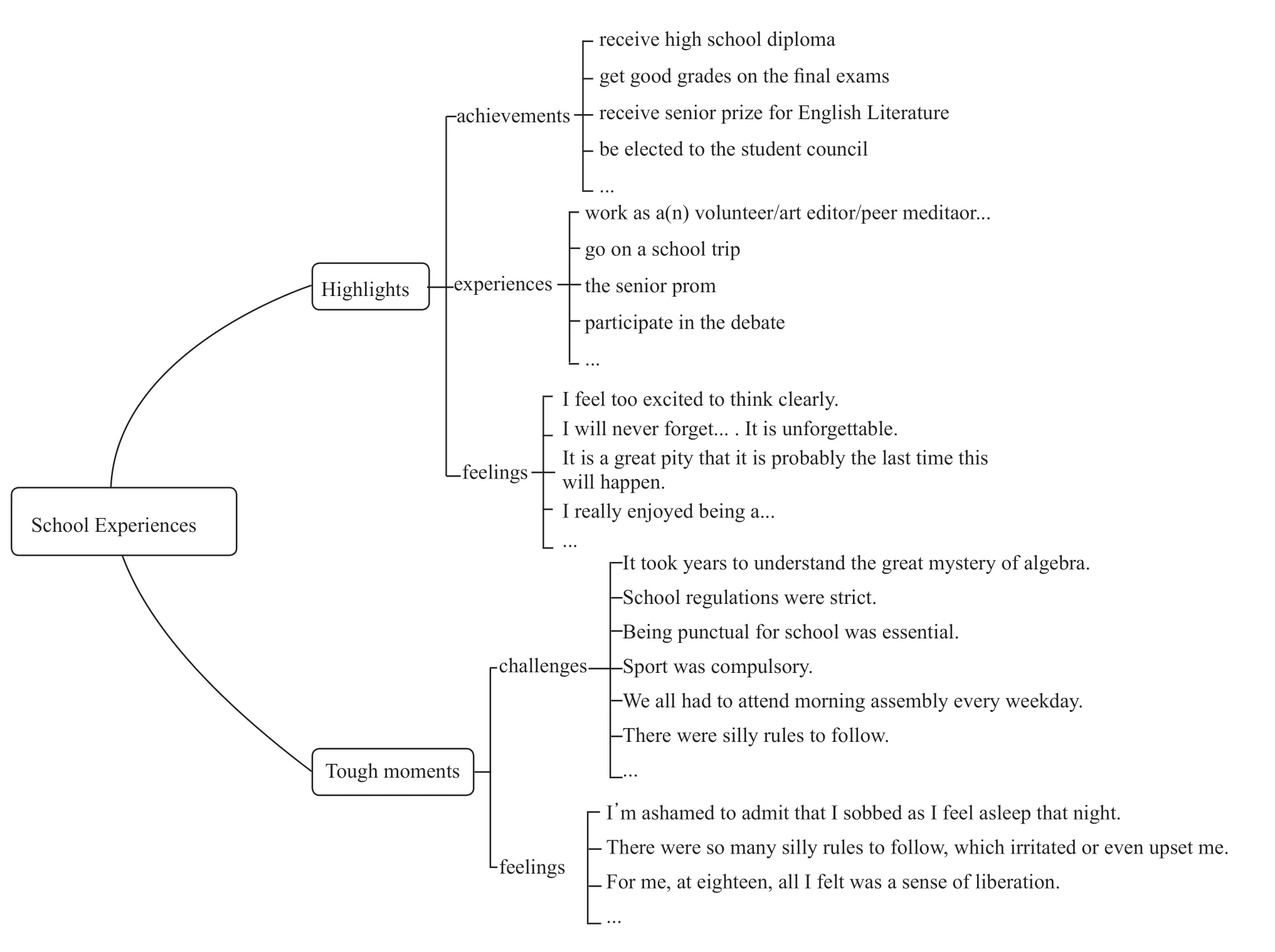
通过对教材内容的复习和语言实践活动,学生对本单元基于主题意义的整体建构得到进一步的回顾和深化认识,每一课时的复习过程最后化零为整,形成思维脉络。初步利用复习课使学生从浅层学习走向深度学习,实现了低阶思维向高阶思维的过渡。下面是三、四课时的思维脉络。
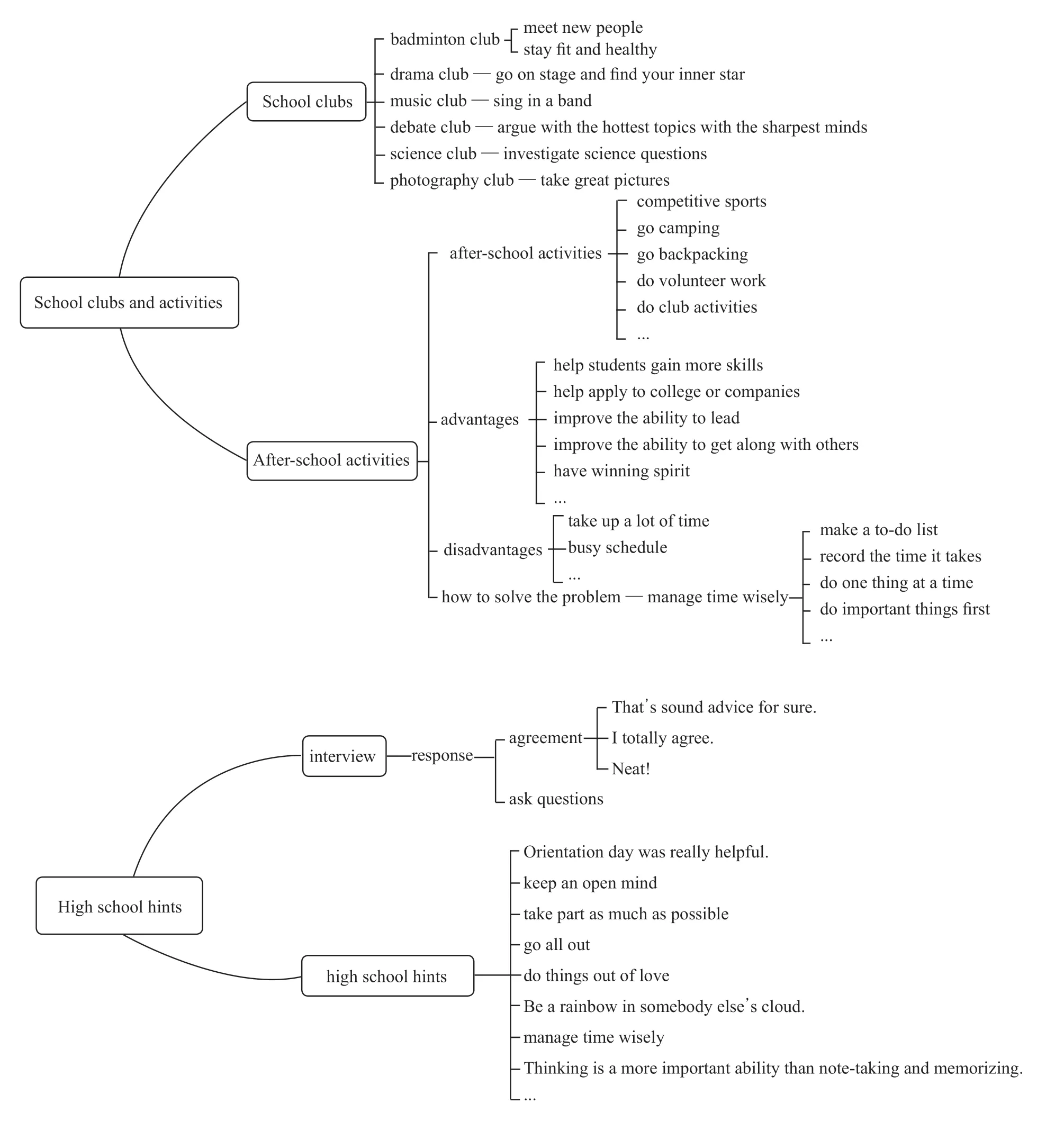
四、教学反思
基于目前学校和一线教师的实际情况,笔者所指的“大单元”主要是指基于学科核心素养、学生认知规律和学科知识逻辑体系建构的最小的学科教学单位,“大单元教学”体现在对学科教学单元内容的二度开发和整体设计中。其主要的设计思路是立足高考和《课程标准》,依据教材顺序,进行单元整合,根据实际情况补充不同版本教材的相关语篇,明确主题与目标后,进行逆向设计。
大单元整体复习关注学科的核心知识,在内容和意义的推动下,很大程度上避免了碎片化、孤立化、唯知识点等问题,能够有效助力学生的深度学习。基于主题意义引领的大单元整体复习打破了现有语言素材之间的边界,通过调整和融合,关注知识获取过程和思维形成过程,极大地提高了复习效率,改善了学生的思维方式。
